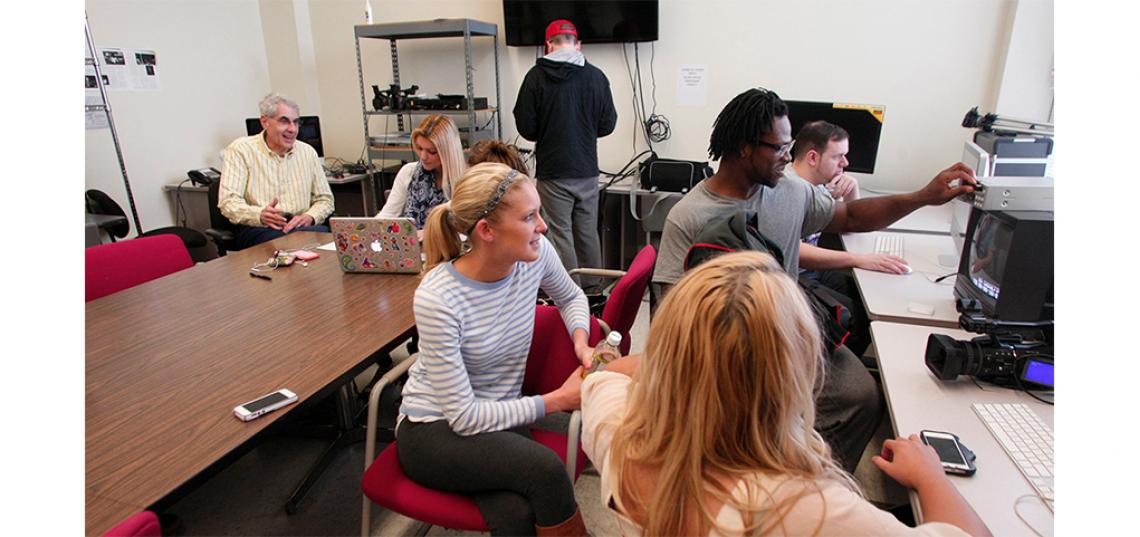
In an industry built around tight deadlines, the pressure is always on for journalists. To keep up with the unforgiving pace of working in the media field, reporters extend themselves, often to unhealthy levels. And it’s not just the deadlines causing journalists stress.
As reported by the Huffington Post, a 2001 study by the Dart Center For Journalism & Trauma found that “upwards of 85 percent” of journalists experience some form of work-related trauma, ranging from worries about job security to the stress related to covering the stories themselves. Today, when journalists are accused of writing or producing “fake news” the pressure has only grown.
“Journalism is stress,” said Juan D. González, the Richard D. Heffner Professor of Communications and Public Policy and co-host of Democracy Now! who teaches journalism and media studies at the Rutgers School of Communication and Information (SC&I). Still, he encourages students not to give up. “Eventually you learn to manage it, and you put everything into perspective,” said González.
Sources of the stress journalists experience come from many directions. Getting the story right means journalists need to take the time to fact-check and revise their drafts. Yet as the industry continues its shift into the digital realm, it becomes tempting for journalists, in order to keep up with their deadlines, to publish first and edit later. This situation has only grown, as deadlines become increasingly shorter.
Getting the news out quickly means reporters have less time to develop stories. Professor John Pavlik, who teaches journalism and media studies at SC&I, has spent a lot of time focusing on the digital age of journalism. He thinks that the rise of smartphones has resulted in a public demand for faster news cycles. The downside, according to Pavlik, is that “it’s very tough to put good quality journalism that is thoroughly fact-checked and thoughtful into that mix.” He thinks the public is being “bombarded” with social media, and that overstimulation has diminished our ability to focus on what is important.
“Now we don’t have one deadline per day, we have numerous deadlines per day that we have to meet,” said SC&I Part-Time Lecturer Bruce Reynolds. He believes that the shift in culture from hard-hitting news to sensationalism has resulted in a news industry that is less informative and more entertainment.
Tight deadlines aren’t the only issue facing journalists. Job security is at an all-time low for journalists. According to the Huffington Post, “Newspaper jobs have declined 40 percent in the last decade.” Broadcast news, although less affected than print, hasn’t fared much better.
Katie Park '16, a reporter for the Philadelphia Inquirer and SC&I alumna, thinks that students don’t often realize the difficulties in finding work right after graduation. “I think that’s something that really hits you once you’re in it. You hear about layoffs. You hear about…reshuffling,” said Park.
As newspapers continue to close, more and more journalists are looking into freelancing for work. However, freelancing comes with its own set of risks. Namely, low wages and no benefits, according to Director of Undergraduate Studies in Journalism and Media Studies, Steven Miller. At the same time, he believes, journalists shouldn’t lose hope. “Journalism is not dying. It’s transitioning. People need news, and it’s just a matter of how people get their news,” he said. As storytellers, journalists play an vital role in how our society works. Miller said, “It’s unbelievable what people don’t realize about the impact that journalism has on their lives.”
As more and more journalists turn to freelancing, “the traditional role of news organizations as gatekeeper has eroded significantly,” said Pavlik. Younger viewers, he argues, have turned away from traditional news in favor of social media, which is partially responsible for the decline in staff writing positions for major news organizations. On the other hand, Pavlik argues there are plenty of opportunities for journalists to find work at major publications, if they look hard enough.
Reynolds, who spent his career managing newspapers, said those who are ambitious won’t have as much difficulty getting hired. “One of the things I always did when I was interviewing people for a job was to see if they had been in competitive situations…[If they were], I was interested,” said Reynolds.
Park offers advice to aspiring journalists about how to manage stress. “If you feel like you’re overtaxed, just say that. Just say ‘I feel like I’ve been doing a little bit too much lately and I need to take care of myself.’ That may not be what some people want to hear, but you need to put yourself first. When you’re off the clock, there’s no obligation to look at twitter, to check your email, to look at Facebook, or anything like that. It’s OK, just put down your phone, put away the computer for an hour or two. Take a nap, go for a walk. Do whatever you have to do. You don’t need to tether yourself to social media, to your phone, and to your email all the time. It’s okay to just disconnect for a little bit and do whatever you have to do that calms you or makes you feel less jumpy, less restless.”
When it’s time to work however, Reynolds tells students to “embrace the challenge.” The best journalists, he finds, are the ones who learn to “thrive on deadlines.” While he doesn’t expect the feeling to come naturally, for most journalists it’s a skill that can be learned over time.
Many individuals who choose to become journalists already understand that it’s not a choice one makes. Journalists are storytellers and activists. They get into the field because for many, they couldn’t imagine doing anything else. As the saying goes, “Journalists write the first draft of history,” and that’s a pretty special place to be.
For students interested in majoring in journalism at SC&I, click here.
More information about SC&I's Department of Journalism, can be found here.
